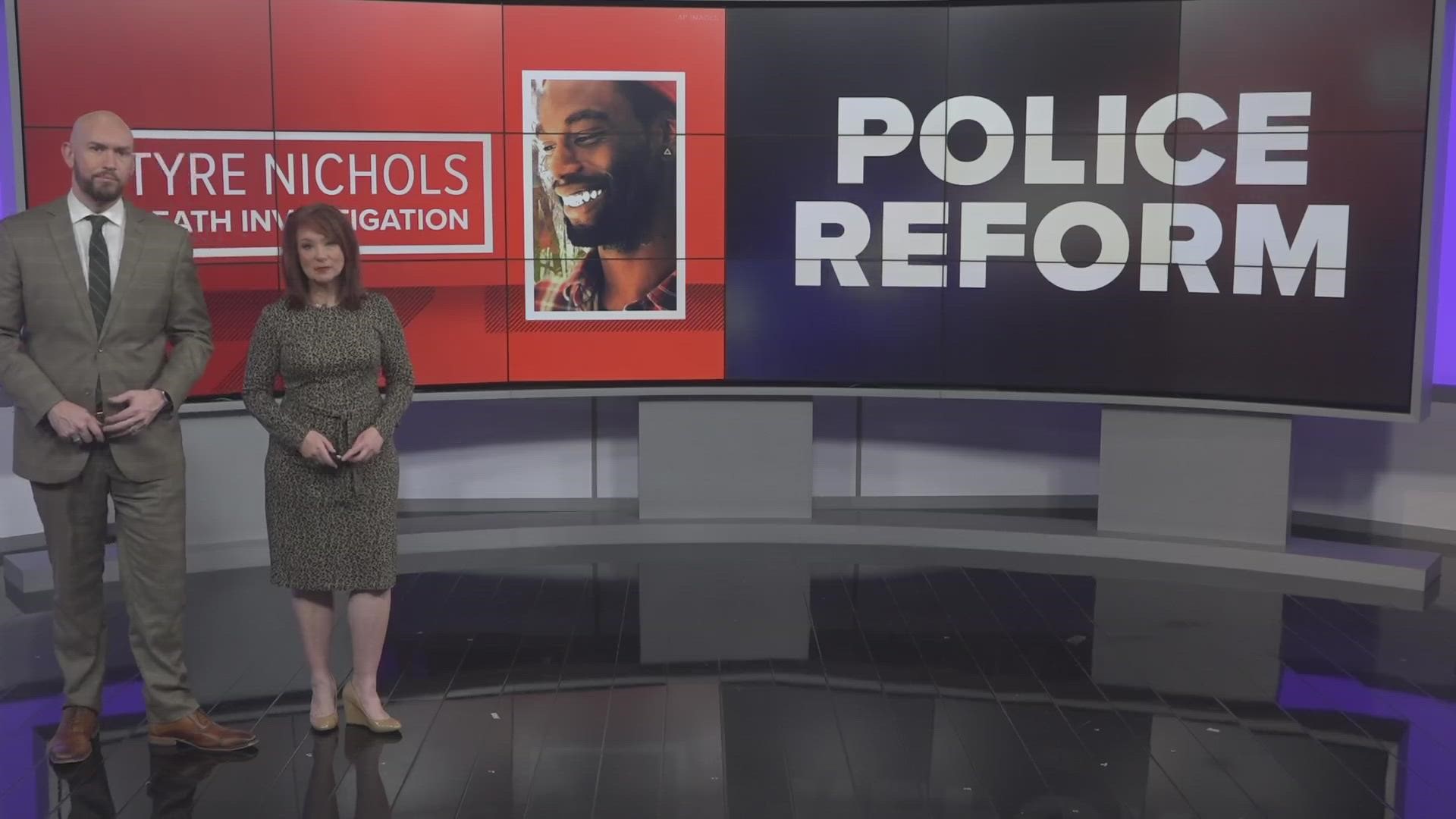GREENSBORO, N.C. — As the horrific video of five police officers beating Tyre Nichols continues to spread across the internet two words are taking over social media: police reform. Lots of folks are talking about whether will it happen and what should be done.
Frank for example tweeted: “‘police reform’ is just a buzzword at this point. Cause what exactly does it even mean?”
That's a great question, Frank. We're going to Dig in 2 to look at what police reform ideas are out that and what's already in the works.
Starting with the latest in the Tyre Nichols case and how it's starting to prompt changes in police departments.
As five fired officers face multiple charges, including second-degree murder, the Memphis Police Chief disbanded the Scorpion anti-crime unit. That's the special task force all five former officers belonged to. The task force has supposed to target high-crime hot spots focusing on gang-related crimes. But the DA says the task force ended up with a history of problems.
“I think it's probably a healthy thing, and I'm glad that Chief Davis is taking decisive action there,” Shelby County DA Steve Mulroy said. “There have been scattered reports of abuses by the Scorpion unit and then nationally, you know, some of these quick-swarm suppression specialty units sometimes can lead to overaggressive tactics.”
Leaders are acting quickly in Memphis. Ben Crump, who represents the Nichols' family, says this needs to be the new standard.
“The fact that these five black police officers were terminated, arrested and charged within 20 days from this tragedy is now the blueprint going forward,” he said. “I mean, you can't tell us anymore that it takes six months or it takes a year.”
George Floyd Justice in Policing Act
This latest case has renewed calls for Washington to pass the stalled George Floyd Justice in Policing Act. The act would require all law enforcement officers to take anti-discrimination training. It also bans chokeholds. Bans no-knock warrants in federal cases. Requires police to try de-escalation techniques before using deadly force. And here's the biggest impact: it changes the law which decides if an officer's use of force was justified.
Instead of trying to figure out if it was "reasonable" --- there would be a higher standard of if it was "necessary.” That means in order to be justified deadly force has to be the only option the officer had to protect themselves or someone else.
Vice President Kamala Harris introduced the bill when she was a senator.
“This bill would hold, law enforcement accountable, and help build trust between law enforcement and our communities. This bill is part of George Floyd's legacy,” she said back in 2021. “The President and I will continue to urge the Senate to pass this legislation, not as a panacea for every problem, but as a start.”
The bill cleared the House in 2020 but never gained traction in the Senate. A lot of Republicans argued that police think there are better solutions that weren't included in the bill. Here's a former officer's take on what he thinks will fix the issues.
“Sadly, with the violence of 2020 and the de-fund the police, large agencies, and smaller agencies lost positions. They lost, you know, training money. And that's a fact,” said Tom O’Conner, who’s also the former president of the FBI Agents Association. “So you can't possibly perceive that you're going to have better policing by having police officers working more hours, being tired, having less training and less supervision. And it's there's no way that that works. So what we have to do is fund law enforcement.”
So what ended up happening is that Republicans introduced their own bill. Democrats and Republicans had a hard time bringing the two together. So we called up UNCG political science professor Thom Little to see what it would take to get a compromise done in DC.
“It's possible, but I'm afraid at the national level the districts are becoming more and more polarized. So there is not a lot of incentive to cross that aisle,” Little said. “So my fear is we've gotten to the point that even when there is an opportunity for compromise, both sides will tend to run to their ideological corner."
Push for fewer traffic stops
While Congress remains gridlocked, all over the country a lot of really smart, talented people have dedicated themselves to researching how to improve policing in America. One of them was on CBS this morning. Alexis Fordjour is a former civil rights attorney and the current co-director of Brooklyn Law School's Center for Criminal Justice. Here's her big takeaway after years of studying the problem:
“My really strong sentiment is to decrease violence between law enforcement officials and the public, is to decrease the contact of intervention that police have the public.
Police do not need to administer stops for basic traffic violations. I know all of us, I can confidently say have engaged in a minor traffic violation,” she said.
The City of Greensboro has led the charge on this idea. Back in 2015, the then-chief banned officers from pulling people over for minor traffic issues like a broken taillight or a cracked windshield. Research from the department shows this move narrowed the racial disparity between the number of stops of black versus white drivers.
Policy Changes
The Forsyth County Sheriff's office also recently made changes to how it handles inmates and restraints. 57-year-old John Neville died in the Forsyth County jail back in 2019. An autopsy showed he died from a brain injury after he was restrained.
In the wake of his death, the Sheriff's office banned the use of "bent-leg prone restraints."
If you have an idea how to reform police departments, e-mail Ben Briscoe at bbriscoe@wfmy.com

